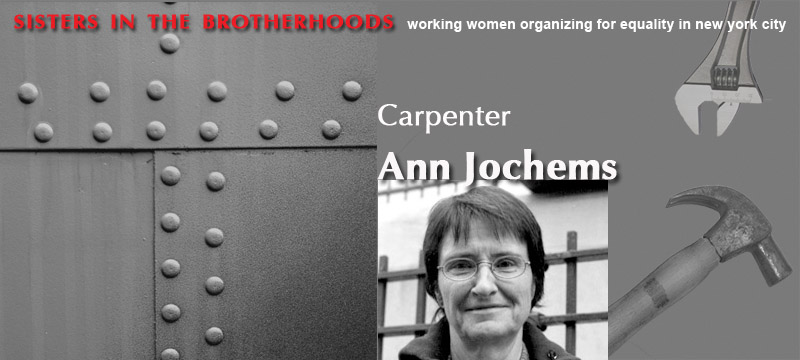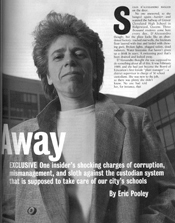 |
||||||||||
|
||||||||||
|
Ann Jochems took a less-traveled route to the carpentry trade. Her journey began in Wichita, Kansas, where she grew up determined to shape her own destiny. A lesbian feminist, Jochems graduated from the University of Kansas and then pursued her interest in nontraditional work. She began a long process of acquiring the skills of a tradeswoman. Jochems worked at odd jobs and attended various training programs in masonry, carpentry, and building maintenance offered by Kansasa City Vocational Technical School. In 1981 she moved to upstate New York, near Syracuse. She worked at nonunion jobs and attended a nine-month program in carpentry and the building trades before enrolling in a yearlong program in woodworking at a community college. Jochems graduated with an associate's degree in woodworking and entered an apprenticeship program with the National Trust for Historic Preservation. She joined a crew sent to Lyndhurst, a National Trust Historic Site located in Tarrytown, New York. The pay was low, and only the least desirable jobs came her way. She seized an opportunity to work as a restorative craftsperson for the Central Park Conservancy, New York City. There she labored alongside union carpenters, civil service employees who earned very good salaries. The attractive wages motivated Jochems to become a city carpenter. By now she had acquired the prerequisite five years' experience, and she tested well. In 1985 she was hired at the journeyman level, becoming the first female carpenter for the Division of School Facilities (DSF), New York City Board of Education (BOE). She worked for BOE as a field mechanic from 1985 to 1991. In that capacity she traveled from school to school doing maintenance. She was given tedious jobs that demanded few skills, and as the only worker who lacked a partner, she was very isolated. In 1987 she scored very high on the test for carpenter supervisor, ranking 23rd on the promotion list. Despite being the only woman on the list (and affirmative-action efforts), Jochems was not promoted until 1991. As a carpenter supervisor, she directed a team of skilled mechanics in the alteration, repair, and maintenance of seventy-five schools in three districts located in Brooklyn and Queens. One of her first actions as supervisor was to rid the carpenters' shop of pornography, a step that earned her much enmity. Sexual harassment was a common experience for women in the skilled trades. As a lesbian, Jochems also was subjected to the virulent homophobia prevalent in the building trades. The other significant feature of life on the job was the degree of systemic corruption in the DSF. in 2001 Jochems learned that she was under surveillance by the office of Special Investigator for Schools. She was charged with "theft of services" because she extended her lunch hour to attend meetings of Alcoholics Anonymous. Jochems, who admitted that she had taken advantage of a common practice at the BOE, was fired in 2002. Her attorney believes that although she was guilty of some charges, none of them were worthy of termination. (Read journalist Jack Schierenbeck's article about Jochem's case.) After leaving the BOE, Jochems received a master's degree in labor relations from Baruch College, City University of New York. She became interested in real estate appraisal and obtained her state license in that field. Her background in construction were valuable assets in her new career as a county appraiser. The job was a civil service position that preserved her pension and seniority rights. In her oral history Jochems discusses the discrimination and harassment she experienced, her dismissal from the BOE, and the courage of Susan D'Alessandro. |
|||||||||
| ||||||||||
Copyright 2012 Jane LaTour/Talking History Photo of Jochems by Gary Schoichet. |
||||||||||
